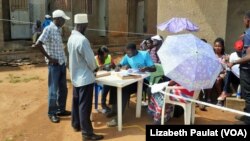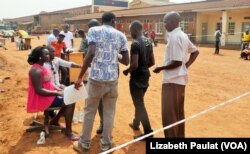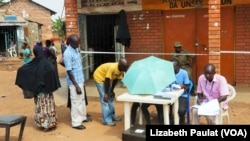Unlike the last week's tense presidential election, which was marred by late delivery of voting materials and election-day unrest, local elections got off to a mostly smooth start Wednesday in Kampala.
At most voting centers, materials arrived within an hour or two of polls opening. And although minor problems were reported, voters said, for the most part, they were happy with the process.
However, polling agents noted that voter turnout was low, despite President Yoweri Museveni urging Ugandans to vote for local mayors and council members.
'Disappointed'
Gloria Paga, an observer at one polling station, said she thought some people were disappointed with the presidential vote, in which Museveni was re-elected to a fifth term.
“The [turnout] is very low, I think it has been a setback from the last presidential elections. I'm not even certain if half of the people that voted last time are coming to vote today," Paga said. "Last time the queues were very long, but today you can see practically at this time there is no one on the line. So probably people are disappointed with what occurred in the presidential elections, but we are optimistic.”
At one station in Nakesero, nearly 600 people were registered to vote, but only 83 had cast their ballot by noon.
Police presence
One Ugandan named Desmond said he feels intimidated by the heavy police presence in the area.
“The regime is succeeding at controlling the people's anger and the hope. It's holding people's hopes at bay. Ugandans have accepted that this regime maybe sort of is here to stay, I can't do anything with it. Unless I come out to say a thing or two, everything of mine will be gone and the last thing I have in my life will be lowered into a grave," he said.
Many within Uganda noted on the distinct lack of reaction when Museveni's victory was announced by the Electoral Commission last Saturday.
The usually bustling streets of downtown Kampala were deserted, as many worried violence could erupt. Although protests never took place, and city life has returned, residents are still uneasy.
Opposition leader arrested
Such feelings are compounded by the continued house arrest of main Museveni's rival, Kizza Besigye, with many Ugandans wondering how long he will be held without charges.
Besigye has called his detainment illegal and said officials are keeping him from challenging the election results.
However, officials in Uganda contend that Besigye's call for protests at the Electoral Commission amount to plans to disrupt public order. They say he has been put under “preventative arrest” to keep the peace.







